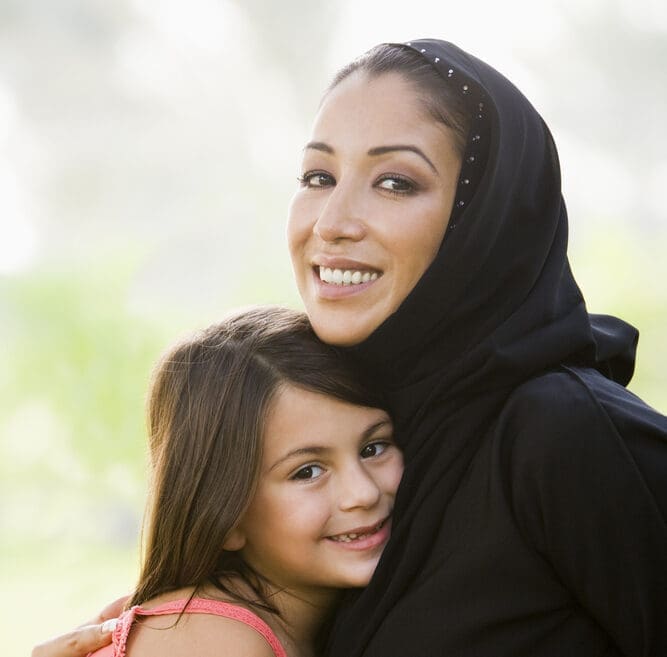What Is The Best Way For Me To Make Dua’ For My Children?
A Practical Guide

“Three duas will not be rejected by Allah: the dua’ of the traveller, the dua’ of one who is fasting, and the dua’ of a parent for his child.” [Tirmidhi]
When we learn to make dua’ it is usually for one of two reasons.
One, to develop the habit of asking from Allah subhana wa ta’ala after salah; and two, to receive rewards, protection, and blessings from the Almighty when doing routine everyday things, such as before and after eating, getting dressed, and going to sleep.
So when we think about making dua’ for our children, it’s natural to assume that we would include such supplications at the end of our Salah, along with the other dua’s that we usually make – for ourselves, our families, Rasul’Allah (pbuh) and the Ummah.
But there is another way to incorporate dua’ into our daily interactions with our children so that we can ask for specific help from the Almighty when and as we need it.
The Prophet (pbuh) said:
“Verily, Allah is merciful, conscientious, and generous. He would be shy for His servant to raise his hands to Him and then not place any goodness in either of them.” [Sahih]

How important is it for parents to make dua’ for their kids?
Dua’ is the weapon of the believer. Part of the responsibility of being a good parent is making regular dua’ for our children – it is our children’s right that we supplicate to the Almighty for them. Numerous dua’s in the Qurán show us that this is something that the Prophet Zakariyya (as) did for his own son.
رَبِّ هَبْ لِي مِن لَّدُنْكَ ذُرِّيَّةً طَيِّبَةً إِنَّكَ سَمِيعُ الدُّعَاء
Rabbi habli min ladunka dhurriyatan tayyibatan innaka samee’u dua’a
“My Lord! Grant me—by your grace—righteous offspring. You are certainly the Hearer of ˹all˺ prayers.” [Qurán 3:38]
In order for our dua’s to be accepted, they have to be sincere. Believing that your heartfelt dua’ will be answered by Allah subhana wa taála is a measure of faith.
Abu Huraira related that Prophet Muhammad (ﷺ) had said:
“Call on Allah being certain that your prayers will be answered but know that Allah does not answer the prayers of a negligent, playful heart.”[Tirmidhi]
Are you making dua’ against your children without realizing it?
The Prophet (pbuh) said:
“Do not pray against yourselves, do not pray against your children, do not pray against your wealth, lest that coincides with a time when Allah swt is asked and He gives, so He answers your prayer.” [Muslim]
Not enough parents have the skillset and tools to be able to cope with challenges they may face with their kids, so when they find themselves in situations that make them frustrated and angry, they lash out and make statements that are to everyone’s detriment – they supplicate against their children.
Without maturity and self-control, parents cannot help children who need guidance and help to do the right thing. Wishing harm for a child who didn’t listen to you, or cursing their health or future children seems a bit extreme, but in a fit of anger, sadly such words are often said. The dua’ of a parent is incredibly powerful and long-lasting, so please be extremely careful how you react when you are feeling upset. Lashing out only ends in regret.
We have a duty to learn how to be good parents, and part of that may involve first addressing our own emotional defects. Learning what triggers us and why, and finding healthy alternatives when we find ourselves becoming emotional can go a long way towards being a great parent.
What is the best way for me to make dua’ for my children?
Daily interactions
Dua’ can be made at any time and in any situation. We most commonly save our dua’s for the prayer mat after Salah, and while that’s certainly beneficial and has great merit, we should take advantage of moments throughout the day during our interactions with our children, to make dua’ for them.
When your child is resisting, pushing back, being stubborn or careless, these are the times that we typically lose our tempers and yell. What if we use those moments to instead make dua’ for our children?
You can recite dua’ from the Qur’an and Sunnah that are specifically for children, or you can use the moment to make dua’ to correct specific behaviors.
For instance, if they resist attending their online Qur’an class, say something like:
“May Allah bless you with a heart that finds joy in the Qur’an”, or
“May Allah give you the gift of beautiful recitation.”
If they are fussing with their siblings, you can say something like
“Allah doesn’t like it when we quarrel, may He put love in your hearts for each other.”
Or if your child keeps their bedroom messy, try saying
“Habibi, Allah loves those who keep themselves clean – try to keep your room tidy and InshÁllah He will include you.”
Use language that is easy and comfortable for you, and make the habit of saying your dua’ out loud so that your children can hear it. When they hear the positive things that their parents are asking for them from Allah subhana wa ta’ala, it will make them more likely to aspire to those qualities insh’Allah.
It’s a small change, but do you see how powerful these words have now become? Now your child is no longer motivated to comply in order to avoid your nagging, now he aspires to please Allah and be among those He loves – subhanÁllah what a beautiful intention for our children to make.
When Shaykh Al-Kalbaani, former Imam of the Ka’bah, was young, he was a very naughty boy. He would make his mother angry. But his mother, may Allah preserve her, was a very righteous woman and she knew the power of Dua’. She made it her habit that, in her anger at him, she would say this Dua: “O Allah guide YOU! And make you the IMAM of the Ka’bah!” Imam Al-Kalbani tells us, “so Allah answered her dua and I went on to become the Imam of the Ka’bah!”
This story is a great example of the power of dua’, especially from a parent for his or her child. When our children’s behavior is far from what we would like, when they’re being uncooperative, difficult, stubborn, and so on, usually the last thing that comes to mind is making dua’. But this is exactly the right opportunity for us to do so.
The example of Shaykh Al-Kalbaani and his mother shows us that when we are the most frustrated with our children, we can really channel our focus into making very specific dua’s for our children. Just think of how powerful that could be! Whatever character flaw or issue we are trying to help our children change or deal with, we have an immediate connection with our Creator in that moment to ask for His very specific help.
After Salah
When you complete your salah, prepare yourself to make your duas by following the Sunnah of the Prophet Muhammad (pbuh):
Begin your dua first with praising Allah and then by sending peace and blessings upon His messenger (pbuh). Then, make dua for yourself, dunya and akhira, for close family and friends, and then the ummah at large. Finish your dua by again sending peace and blessings on the Prophet (pbuh) and praising and thanking Allah swt. The Prophet (pbuh) said:
“When one of you [prays], then let him begin by expressing gratitude to Allah and praising Him. Then, let him send Salat upon the Prophet (pbuh), then let him supplicate after that, whatever he wishes.” [Tirmidhi]
My dua’s aren’t being answered – When we make sincere dua’ to Allah subhana wa ta’ala, He never refuses us. It may seem sometimes that He is ignoring our pleas and we can begin to feel discouraged. Rather, the Almighty answers us in one of three ways:
- Yes, your dua’ is answered immediately
- Yes, but not yet, as He wishes us to show patience and constancy with our dua’
- Let me give you something better. He subhana wa ta’Allah is the greatest of planners and knows what is ultimately better for us, even though we may not see the wisdom in it at the time.
Make dua for each and every thing, ask Allah and continue to ask Him. One of our scholars of the past said:
“The son of Adam, the more you ask him, the more irritated he gets with you, but the more you ask Allah, the more He loves you.”
Be mindful of not simply repeating your dua’s ritualistically. Instead, try to reflect on the dua’ and its meaning and say it with true sincerity, keeping your child in mind as you supplicate.
Parenting is tough – and in many ways it’s more difficult now than it was for our parents’ generation – so why not seek help from Allah subhana wa taála? He specifically gifted our children to us, knowing that we were best equipped to raise them, but like anything, we are only successful when we seek His help.
Make the intention each morning to be mindful in your parenting, and ask the Almighty each day to remind you to call out to Him for help raising your children. We are judged on our intentions, and what work is more noble or more highly rewarded than raising the next generation of the Ummah. Seek Allah’s help in such moments and not only will you feel comfort in knowing that you have asked the only One who has the power to make such changes, you will feel calmer knowing that you are doing your best – trying to teach and lead your child to the right behavior and also turning to Allah subhana wa ta’ala for help.
Framing your conversations with your children around their reward from Allah subhana wa ta’ala rather than around fear of punishment from you, can really turn things around for your children, and for you. When your children hear you make dua’ for them on a regular basis, it’s a very powerful motivator for them to try harder.
This is living with Ihsaan.
Anas ibn Malik reported that a man said:
“O Messenger of Allah, should I tie my camel and trust in Allah, or should I leave her untied and trust in Allah?” The Prophet, peace and blessings be upon him, said, “Tie her and trust in Allah.” [Tirmidhī]



Trackbacks/Pingbacks